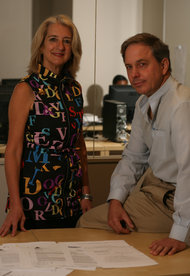 Ozier Muhammad/The New York TimesAnn E. Rutledge and Sylvain R. Raynes are the founders of RR Consulting. They plan to name their new business Trade Metrics.
Ozier Muhammad/The New York TimesAnn E. Rutledge and Sylvain R. Raynes are the founders of RR Consulting. They plan to name their new business Trade Metrics.
Credit ratings agencies have few friends on Wall Street or in Washington.
Politicians have pilloried them for bestowing top marks on risky mortgage investments. Big investors have accused them of missing the problems with subprime loans. And regulators have been writing rules to diminish the importance of their ratings.
But Ann E. Rutledge and Sylvain R. Raynes, two veteran credit analysts who founded RR Consulting, think it is an ideal time to enter the industry. After more than a decade of running their own firm, they are applying to be officially recognized by the government as a credit ratings agency. They aim to inject a dose of reality into an industry that they say has been clouded by a desire to please clients.
“Somebody has to do it,” Ms. Rutledge said. “In this business, if there isn’t somebody in the middle who is willing to tell the truth, then there is no basis in trust.”
It has been a slow and arduous process.
In 2006, Congress developed guidelines for potential credit ratings agencies to become licensed. Lawmakers hoped the new rules would encourage smaller players to jump into the industry and shake up the business, which traditionally had been dominated by Standard Poor’s and Moody’s.
Still, the hurdles remain high, say upstarts like RR, which plans to operate under the name Trade Metrics after it gets licensed. Applicants are required to furnish 10 letters from banks, pension funds or other institutions that have used their credit ratings.
But customers can be reluctant to vouch for a fledgling credit ratings agency. Experts say that some companies may see little benefit, and even a potential liability, in revealing what can be a confidential business relationship. RR, which has had dozens of clients, has been able to get only eight letters in a little more than a year.
One RR client, Charles W. Gerber, the president of the boutique investment bank Triumph Global Securities, turned down the firm’s request, citing the advice of counsel. In an e-mail, Mr. Gerber declined to elaborate on his relationship with the ratings company.
“Customers may be happy to employ RR, and pay some fees, but a public vouching may be more than the customer wants to do,” said Lawrence J. White, a professor at the Stern School of Business at New York University, who has testified before Congress on credit ratings agencies. Some customers, he said, may ask, ‘What’s in it for me?’ ”
In the years since the rule passed, the makeup of the industry remains relatively unchanged. Just nine credit ratings agencies have the government’s approval, compared with five before 2006.
Ms. Rutledge, 58, and Mr. Raynes, 54, are undeterred. With RR, they are aiming to take on the giants. As they see it, credit ratings agencies are paid to provide the critical perspective.
“An architect can design a building that is going to collapse. A civil engineer cannot afford to do that,” said Mr. Raynes, an engineer by training. “That’s why they don’t like each other.”
It is a philosophy honed over two decades in the business. The married couple first met in the 1990s at a training class while working at Moody’s. Ms. Rutledge, who was based in Hong Kong at the time, says she was initially put off by Mr. Raynes’s messy handwriting, but she soon found him to be “the smartest” analyst at the firm. They said that in those days, Moody’s was like a university, with an open exchange of ideas.
By the late 1990s, they had become disenchanted with the business. In Mr. Raynes’s view, it was transforming into a “rollover shop,” aiming to please its clients rather than to offer sometimes-critical opinions.
Michael N. Adler, a Moody’s spokesman, said that “the quality and independence of our credit ratings has always been of paramount importance to us, and we have strong protections in place to separate the commercial and analytical aspects of our business.”
The pair, which started RR in 2000, have offered a variety of services over the years. They have written two textbooks on the makeup of structured securities. They have taught college courses and have trained officials at the Federal Deposit Insurance Corporation.
They also have been vocal critics of the flaws in the financial system. In early 2004, speaking at an event sponsored by New York University, Ms. Rutledge argued that the boom in complex securities like collateralized debt obligations paralleled the events leading to the market crash of 1929. With home values soaring at the time, the reception to her warning was icy, she recalls.
Last year, Mr. Raynes’s appearance on CNBC went viral after he suggested facetiously that Jim Cramer, host of the program “Mad Money,” was a “public relations officer” for Goldman Sachs. Mr. Cramer, who had been discussing a big lawsuit by the Securities and Exchange Commission against Goldman, dismissed the charge, taking offense.
RR, which operates out of a small office near New York’s Grand Central Terminal, offers clients the same blunt talk. The firm’s seven employees use custom-built software to predict defaults in portfolios of loans, or to rate investments like asset-backed securities. If a deal doesn’t pass muster, they let their clients know.
“We consider them our third-party independent advisers slash consultants,” said Magchiel Groot, a senior investment officer at the Netherlands Development Finance Company, a public-private bank based in The Hague. “We present a case to them, and then we let them shoot at it.”
Article source: http://feeds.nytimes.com/click.phdo?i=8ff28ff431eb620dec5f8c2679738053